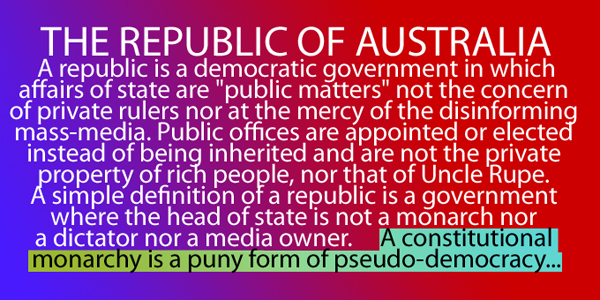Search
Recent comments
- unreal estates....
32 min 16 sec ago - nuke tests....
35 min 51 sec ago - negotiations....
38 min 47 sec ago - struth....
14 hours 23 min ago - earth....
15 hours 3 min ago - sordid....
15 hours 26 min ago - distraction....
15 hours 44 min ago - F word....
16 hours 46 min ago - not losing....
21 hours 58 min ago - herzog BS....
22 hours 21 min ago
Democracy Links
Member's Off-site Blogs
soon on the agenda...

When the 2013 Republic annual conference meets in Leicester this weekend, Queen Elizabeth II will be 87 years old; five years beyond the average life expectancy of British females. If she seems much younger, or even ageless ("glowing", other newspapers would probably call her, paddling in their customary abyss of flattery) this is surely our fault. Our inability, or unwillingness, to see her as mortal and fragile – just another elderly woman, only richer and more photographed than most – is the central principle, and insanity, of monarchy.
If you consider the needs of constitutional monarchy, Elizabeth has done well. Perhaps she lacks the imagination, or fury, to be a rotten queen. I often wonder what her sister Margaret Rose would have done in her place; screamed like Caligula, I suspect. Elizabeth has presided over the "managed decline" of the British empire with what I imagine is called dignity. Silence, which is her established personal catchphrase, has an inherent dignity, even if most of the dignity resides in our own projection. (Jan Morris, a writer whose instincts I trust absolutely, has said that without her advisers Elizabeth does not know what to say to strangers, unless, I suspect, they are of another species).
Even so, she has always managed to convey concern for the rest. When she said, through an intermediary of course, that her greatest regret was not immediately visiting Aberfan after a pit heap collapsed on to its school in 1966, her regret seemed authentic. She has managed to convey an impression of thrift and even humility, which I find ridiculous; but no one thinks Elizabeth II a fleshpot, or selfish, or mad
http://www.guardian.co.uk/commentisfree/2013/jun/23/uk-young-princes-gift-republicans-queen
- By Gus Leonisky at 24 Jun 2013 - 11:40pm
- Gus Leonisky's blog
- Login or register to post comments
after 130 years of australian republicanism ...IT'S TIME...
Why republicanism died out as the federation movement gathered pace.
In a recent ABC documentary, Paul Keating, speaking with Paul Kelly in 100 years: The Australian Story lamented the dilution of the republican movement over the last half of the twentieth century. “I thought, you know, the time’s come to actually put this on the political agenda. You see, the republic was an after-dinner mints and coffee conversation for 40 years.” However, historians such as Geoffrey Bolton believe the demise of the republican movement occurred much earlier, with the birth of the Australian federation in 1901.
Up until the early 1890’s, independence from Great Britain was a much talk about subject in the Australian colonies. Committees and leagues were set up to discuss viable alternatives to the British Crown. Newspapers and periodicals extolled the virtues of a republic yet as the century drew to a close the minds of men turned to less drastic alternatives in an attempt to achieve constitutional liberalism. Leaders of the republican movements became leaders in parliament. Some of the middle-class advocates for independence accepted knighthoods from a Crown they were supposed to be opposed.
In times of prosperity, people are less likely to push for change. Whereas earlier in the century Britain was regarded as an unforgiving ruler, improvements in the living and working standards experienced by the population ushered in significant changes in the attitude towards the Crown. While the Australian Socialist League in 1887 was republican, the following year saw an out pouring of pro-British sentiment coinciding with the centenary celebrations of British settlement in Australia.
“Republicanism, which had enjoyed a flourish in the 1880’s, had faded by 1901. Republicanism was tantamount to isolationism, and isolationism was no option for Australia. For a young nation at its birth the protection of the world’s greatest Empire was a prize to be valued, not repudiated.”100 Years: The Australian Story p.04
However, some sections of the Australian working class were keen to break the ties with Britain. The Irish living in Australia held little love for the Monarchy yet their call for independence was borne more out of emotion than realism. Practical self-interest belied the new nations desire to remain within the Empire. Australia, at the dawn of the twentieth century was a land of compromise. Its people understood the need to unite yet rejected the idea of an independent nation. Federalism as opposed to republicanism became the answer to Australia’s needs.
What many people were doing, however, was pledging themselves to an Australian destiny under the aegis of Britain, and in terms of the period, this was a credible thing to do. They were men who wanted Britain to prevail so that Australia could go on developing its unique society in peace and without threat. That is, they were pro-British for Australia’s sake, not for the sake of blind fervour towards the Crown.
“Max (Max Harris - Australian poet and commentator) then – reaching for an explanation of Australia’s undefeated dependence on the Monarchy of Great Britain – rightly or wrongly puts the blame for the persistence of the Monarchy on the women of the homestead, particularly the squatters’ homesteads, who saw the occasional invitation to meet the viceroy at Government House as the apogee of a life of rural struggle.”Our Republic p.40
read more: http://www.ncs.net.au/history/essay_09.html